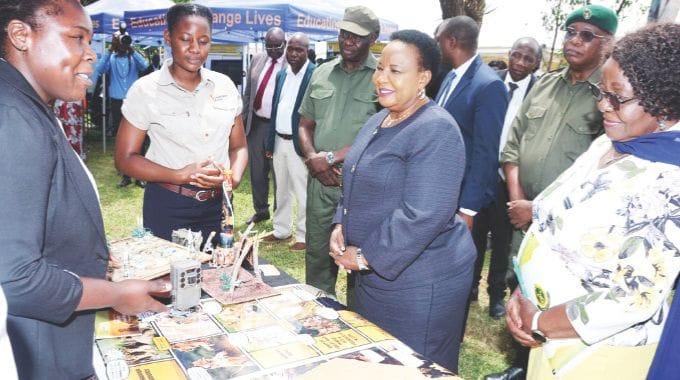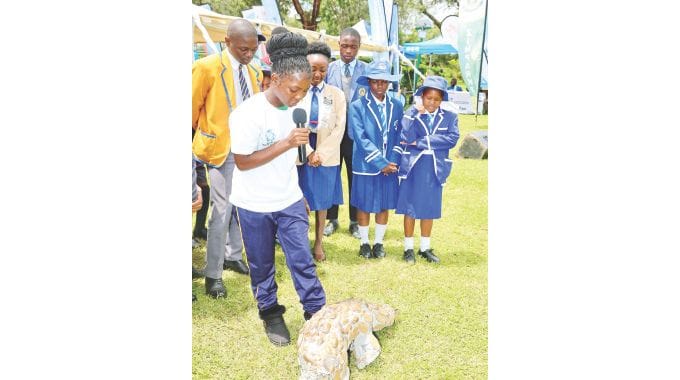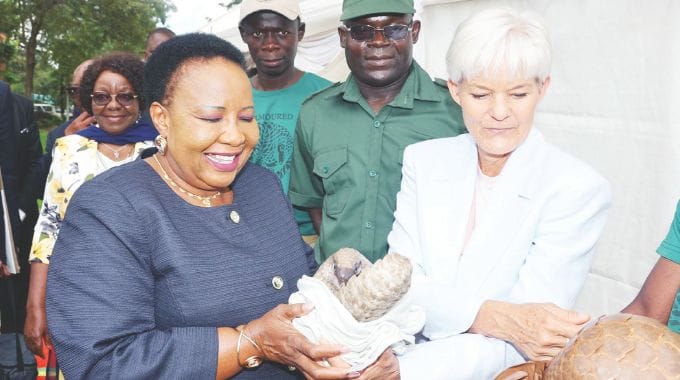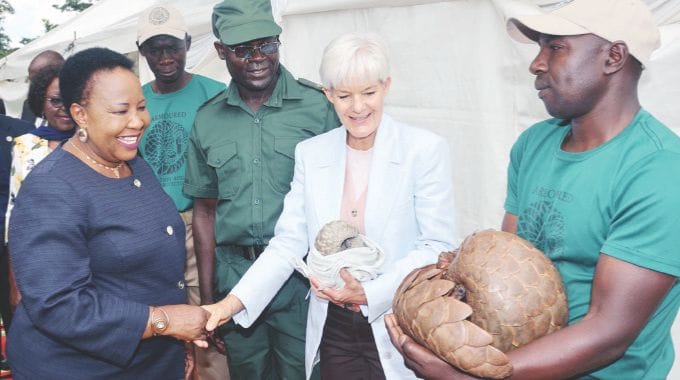Call to scale up funding for conservation
Tendai Rupapa
Zimbabwe needs to have a coordinated domestic, regional and international response to combat the poaching scourge that threatens some wildlife species with extinction, Environment and Wildlife Patron, First Lady Dr Auxillia Mnangagwa has said.
She said this in her remarks at the World Wildlife Day commemorations in Harare on Monday.
The commemorations were held under the theme, “Wildlife conservation finance: Investing in people and planet”.
Amai Mnangagwa, an avid environmentalist, always reiterates the need for people to protect endangered species so that they are not at a high risk of becoming extinct in the near future.
Pangolins are CITES listed species that need special protection as their survival is threatened in some other parts of the world.
Recently, Dr Mnangagwa received a female pangolin from Headman Clive Makusha Chimbi of Mvuma, for onward transmission to the Zimbabwe Parks and Wildlife Management Authority (ZimParks), in her capacity as the patron.
When the pangolin was presented to Amai Mnangagwa, it was pregnant and it gave birth the following day.
During the World Wildlife Day commemorations, the pangolin and its offspring were shown to the First Lady.
Zimbabwe values pangolins, which are an integral part of culture, tradition, and folklore.
Communities are aware and alive to the protection of natural resources.

During the celebrations, all stakeholders thanked the First Lady for her awareness campaigns countrywide on environment and wildlife preservation, which they said culminated into Headman Chimbi coming all the way to Harare to hand over a specially protected animal in the form of a pangolin.
World Wildlife Day is celebrated every year on March 3 to celebrate wild animals and plants by recognising their unique roles and contributions to people and the planet.
Dr Mnangagwa also held an interactive session with learners drawn from schools around the country, where she reinforced the need for environmental conservation and protection of wildlife.
The mother of the nation asked the learners about wild animals, their behaviour, what they eat and where they live, to sharpen and widen their knowledge.
A learner spoke about a lion saying it eats other animals, and when asked how the lion survives without prey, he said it turns to grass.
However, the First Lady corrected him saying lions were carnivores and do not eat grass.
In her address, Dr Mnangagwa said World Wildlife Day was celebrated on March 3 every year in line with the United Nations General Assembly resolution that recognises the intrinsic value of wildlife and its contributions to the various dimensions of sustainable development.

The World Wildlife Day commemoration, she said, was annually organised by the Convention on International Trade in Endangered Species of wild FAUNA and FLORA (CITES).
“Zimbabwe is a part to CITES, a convention that provides a framework for regulating legal and sustainable international wildlife trade. Zimbabwe, therefore, strictly adheres to the dictates of the convention in the discharge of its wildlife mandate. “Wildlife conservation is a huge and expensive business which cannot be left to the Government alone. It needs the participation and involvement of all stakeholders,” she said.
The 2025 World Wildlife Day, Dr Mnangagwa said, reminds the nation of the need to have a coordinated domestic, regional and international response to combat the growing poaching scourge.
“Let us use this commemorative celebration to reflect on how we can effectively combat wildlife crime in all its forms. Recently, the world commemorated other important days, World Pangolin Day and World Hippopotamus Day, both on the 15th of February.
“The two are CITES listed species which need special protection as their survival is threatened in some other parts of the world. In Zimbabwe, we are happy to report that the hippopotamus population is stable and increasing whilst the pangolin remains a specially protected species in terms of our laws. The pangolin remains one of the most heavily legally harvested and trafficked animals in the world.
“Let’s protect and conserve our pangolins. In line with CITES provisions, Zimbabwe places a greater focus on species threatened with extinction and those not yet threatened with extinction, but may become so if not well regulated. Zimbabwe is endowed with a rich biodiversity characterised by huge wildlife populations,” she said.

Unfortunately, the huge wildlife populations, especially the over abundant elephant populations, the First Lady said, have resulted in extensive damage to ecosystem inhabitants in addition to increasing human wildlife conflict incidences.
“Currently, Zimbabwe’s elephant population sits at over 85 000, the second largest population in the world, far exceeding its capacity of 45 000 hence we now face an elephant overpopulation problem.
“Over the past five years, more than 290 people have been killed and a lot more injured by wild animals. More than 2 000 livestock have been lost to wild animals in addition to loss of property and crops. The need to reduce populations in our protected areas needs no emphasis,” she said.
The environment and wildlife ambassador said there was a need to address the problem of over abundant elephant populations in Zimbabwe.
“This overpopulation problem is further compounded by international commercial elephant and ivory trade restrictions put in place by the CITES. Trading in elephants and ivory is in line with our constitutional mandate of using our natural resources for the benefit of the Zimbabwean citizens.
“It is important to note that Zimbabwe’s policies that ensure that the use, harvesting and trade of wildlife species is ecologically sustainable, safe, legal and consistent with CITES provisions. Discussions at the 16th Conference of the Parties to the Convention on Biological Diversity meeting held in Colombia and the second resumed session of the same conference held in Rome, Italy and Colombia respectively revolved around biodiversity conservation financing. This shows the importance and centrality of partnerships in financing of biodiversity.
“It is important that as a country we prioritise the implementation of the Kunming Montreal Global Biodiversity Framework, KM-GBF.
“The continued loss of biodiversity poses a significant threat to both nature and the human well-being, making the need for mobilisation of financial resources from all stakeholders much more important.
“Both the global and domestic wildlife conservation financing gap cannot be closed without adopting a whole of society approach in wildlife conservation,” she said.

Such a need, Dr Mnangagwa said, underscores the importance of development finance for wildlife conservation.
“I, therefore, urge all stakeholders to continue exploring opportunities to strengthen cooperation, collaboration and synergies across all relevant sectors of our economy. As a country, we recognise the critical role played by local communities in wildlife conservation and hence we prioritise the contribution of wildlife resources to community livelihoods in line with our National Development Strategy 1. Wildlife occupies an important place in rural economies as it ensures that rural communities are also active players in national economic development.
“This guarantees inclusive national economic development, leaving no place and no one behind, as is often called out by our President, His Excellency, Cde Dr E.D Mnangagwa. Our position as a country is clear. We stand for sustainable use of wildlife resources for the benefit of our people, particularly those who co-exist with wildlife,” she said.
The Parks and Wildlife Amendment Bill, Dr Mnangagwa said, is undergoing the final stages of the legislative process and the gazetting of the Bill will go a long way in closing the information gaps identified over the years by law enforcement agencies as well as the courts of law in the delivery of justice.
“It also addresses the rights of local communities and further protects customary sustainable use by the same. We are grateful for the funding of capacity-building initiatives by our conservation partners in areas such as Matabeleland North, Zambezi Valley, South East Lowveld and many other places. In the spirit of developing the inter-agency coordination and capacities needed to tackle wildlife crime offences, Zimparks partnered with other Government institutions like the Zimbabwe Republic Police, Zimbabwe Revenue Authority, Immigration Department and other Government institutions to improve intelligence sharing and strengthening of border controls through the establishment of the multi-agency crime intelligence units in the Zambezi Valley. Such initiatives improve our capability as a nation to combat poaching and send out a message that there is zero tolerance on poaching” she said.
“Sophisticated transnational organised crimes committed by organised syndicates call for stronger criminal justice systems with robust legal frameworks as well as transparent prosecutorial and judicial processes,” she said.

Transnational criminal syndicates can only be busted through international cooperation and cross-border investigations, the First Lady said.
“Therefore, the role played by regional and international agreements need no emphasis. Zimbabwe Parks and Wildlife Management Authority has got several co-management agreements which have brought the much-needed financial resources. Such agreements include Gonarezhou Conservation Trust, Matusadona Conservation Trust and partnerships in managing protected areas such as Umfurudzi Park, Chizarira National Park and Mana pools National Park.
“Such partnerships place community development at the centre of their activities. We are grateful to organisations like International Fund for Animal Welfare, the African Wildlife Foundation, Frankfurt Zoological Society, Peace Parks Foundation, African Parks and many others, which have partnered with the Government in building and maintaining infrastructure like roads, houses and equipment. We all have a duty to conserve and sustainably use our natural resources for us to achieve our Sustainable Development Goals, SDGs, especially SDG 15, that calls for protection of sustainable use of terrestrial ecosystem systems and halting biodiversity loss. We must remain united in our commitment to prevent and counter wildlife crime in all its forms and wherever it occurs,” she said.
The First Lady said Zimbabwe empowers its local communities through participation and collaboration to conserve wildlife resources and livelihoods by designating rural district councils as appropriate authorities in wildlife management through the Communal Areas Management Programme for Indigenous Resources Programme (Campfire).
“As I conclude, Zimbabwe will soon engage all stakeholders including fellow countries which are parties to CITES to find common ground on all contentious CITES issues including the elephant trade CITES impasse.
“As is often enunciated by our President, we are a country that firmly believes in engagement and re-engagement,” she said.
Speaking at the same event, Zimparks director-general Professor Edson Gandiwa praised the First Lady for her role and dedication to wildlife conservation issues, especially her assistance in addressing human wildlife conflict issues nationwide.
“Thank you very much Your Excellency, for being a leading voice in the protection of wildlife. The 2025 Wildlife Day theme is worthy of rallying around as it fosters cooperation in the conservation business. Such partnerships range from local community participation in resource protection to financial investments by such organisations including Non-Governmental Organisations (NGOs). All of you are important to us and we are proud to be associated with all of you,” he said.
Prof Gandiwa shared basic statistics concerning Zimbabwe’s wildlife populations.
“Zimbabwe has over 5 930 vascular plant species, over 670 bird species, over 270 mammal species, more than 256 known reptile species, about 120 amphibian species and approximately 151 fish species. Zimbabwe deservedly prides itself in having the second largest elephant population in the world and fourth largest rhino population in the world.
“About 28 percent of Zimbabwe’s surface area is under some form of wildlife management. We also have the most successful crocodile conservation and crocodile ranching industry and a top exporter in the Southern African Development Community (SADC). A huge conservation funding gap exists in biodiversity conservation. Investing in wildlife is a collective responsibility for us all, recognising the whole-of society and whole-of-government approach we commemorate this day.”
Zimbabwe has a world-class track record in conservation and protection, Prof Gandiwa said.
“Our wildlife remains well protected both within and outside protected areas and continues to be a significant attraction to tourists for both consumptive and non-consumptive use. Zimbabwe has Africa’s big five game, that is, lion, elephant, buffalo, leopard and rhino. The precious international endorsement as a prime destination is deserved and it is our collective responsibility to conserve,” he said.
As a member State of SADC, Prof Gandiwa said Zimbabwe was also implementing the SADC Law-enforcement and Anti-Poaching Strategy to fulfil its aspirations under the SADC Protocol on Wildlife Conservation and Law Enforcement of 1999.
Environment, Climate and Wildlife Minister, Dr Sithembiso Nyoni, said World Wildlife Day marks the most important day in wildlife conservation as the world over people gather around to celebrate the world’s wildlife heritage.
“Celebrations of this nature are defining moments as we take time to appreciate the importance of wildlife in our lives. Zimbabwe’s economy is also significantly driven by tourism, which is anchored by rich wildlife populations throughout the country. This underlines the integral role played by wildlife not only in our country, but the world over. Your Excellency, the people that are gathered here have come because they embrace the idea that wildlife conservation is a collective responsibility, it is not the Government’s responsibility alone. We fully appreciate your presence here as we are aware of your busy schedule. Thank you for finding space in your busy schedule to join us in celebrating Zimbabwe’s rich wildlife heritage. Your Excellency, it is my honour to inform you that my Ministry is fully committed to its wildlife conservation mandate as given by the President of the Republic of Zimbabwe, His Excellency, Cde Dr E.D Mnangagwa,” she said.
Chief Chinamhora said it was critical to protect the environment at all times.
“Land, trees, mountains, wildlife and everything that grows on land is our heritage that we need to preserve for generations to come. As chiefs, we are the eyes of the nation for the protection of the environment, the protection of the land, the preservation of forests, preservation of tree species. We know there is nowhere we can celebrate wildlife in the absence of the land,” he said. – Herald

